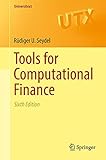Tools for Computational Finance / by Rüdiger U. Seydel.
Series: UniversitextEdition: 6th ed. 2017Description: 1 online resource (XXII, 486 pages 109 illustrations, 50 illustrations in color.)ISBN:- 9781447173380
| Item type | Current library | Call number | URL | Status | Date due | Barcode | Item holds | |
|---|---|---|---|---|---|---|---|---|
 E-Book
E-Book
|
Strathmore University (Main Library) Online Resource | Link to resource | Not for loan | Kaloleni - 5006 |
1 Modeling Tools for Financial Options -- 2 Generating Random Numbers with Specified Distributions -- 3 Monte Carlo Simulation with Stochastic Differential Equations -- 4 Standard Methods for Standard Options -- 5 Finite-Element Methods -- 6 Pricing of Exotic Options -- 7 Beyond Black and Scholes -- A Financial Derivatives -- B Stochastic Tools -- C Numerical Methods -- D Extended Tree Methods -- E Complementary Material -- References -- Index.
Computational and numerical methods are used in a number of ways across the field of finance. It is the aim of this book to explain how such methods work in financial engineering. By concentrating on the field of option pricing, a core task of financial engineering and risk analysis, this book explores a wide range of computational tools in a coherent and focused manner and will be of use to anyone working in computational finance. Starting with an introductory chapter that presents the financial and stochastic background, the book goes on to detail computational methods using both stochastic and deterministic approaches. Now in its sixth edition, Tools for Computational Finance has been significantly revised and contains: Several new parts such as a section on extended applications of tree methods, including multidimensional trees, trinomial trees, and the handling of dividends; Additional material in the field of generating normal variates with acceptance-rejection methods, and on Monte Carlo methods; 115 exercises, and more than 100 figures, many in color. Written from the perspective of an applied mathematician, all methods are introduced for immediate and straightforward application. A 'learning by calculating' approach is adopted throughout this book, enabling readers to explore several areas of the financial world. Interdisciplinary in nature, this book will appeal to advanced undergraduate and graduate students in mathematics, engineering, and other scientific disciplines as well as professionals in financial engineering.
There are no comments on this title.
